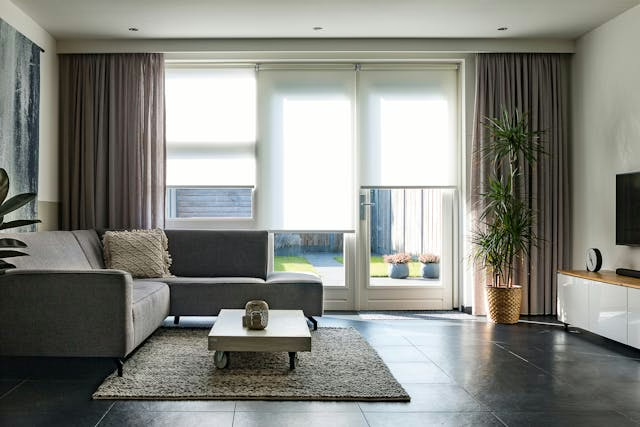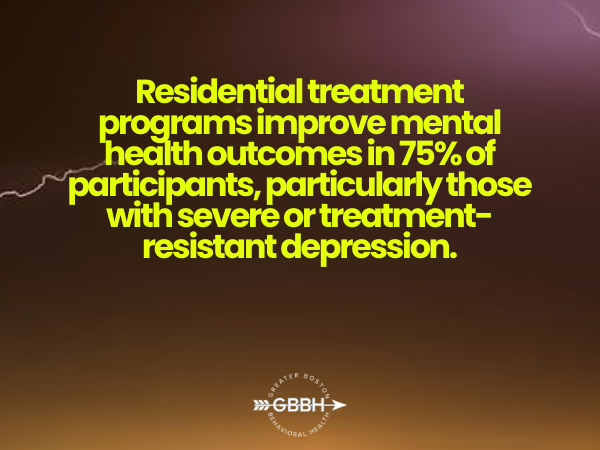Depression is a serious mental health condition that affects millions of individuals each year, often interfering with their ability to work, maintain relationships, and experience a fulfilling life. For those dealing with severe depression, traditional outpatient therapy may not be enough to provide the level of care and support required for meaningful recovery. A residential treatment program offers a structured, intensive, and holistic approach to address severe depression, giving individuals the tools they need to heal and build a brighter future.
At Greater Boston Behavioral Health, we specialize in helping individuals with severe depression through evidence-based care tailored to their needs. As part of our commitment to providing exceptional care in Boston behavioral health, we explore how residential treatment can support recovery from severe depression and why it’s a vital step for those struggling with this condition.
Understanding Severe Depression
Severe depression, also known as major depressive disorder (MDD), is more than just feeling sad—it’s a debilitating condition that can impair daily functioning and lead to life-threatening consequences if left untreated. Symptoms of severe depression often include:
Emotional Symptoms:
- Persistent sadness, hopelessness, or emptiness.
- Feelings of worthlessness, shame, or guilt.
- Difficulty experiencing pleasure or joy.
Physical Symptoms:
- Chronic fatigue or low energy.
- Changes in appetite or weight.
- Sleep disturbances, such as insomnia or oversleeping.
Behavioral Symptoms:
- Withdrawing from social interactions.
- Inability to concentrate, make decisions, or complete tasks.
- Thoughts of self-harm or suicide.
Severe depression requires more intensive care than standard outpatient therapy can provide. A residential treatment program offers a safe, structured environment where individuals can focus on their recovery without external stressors or triggers.
What Is Residential Treatment for Depression?
A residential treatment program is an intensive form of care where individuals stay at a treatment center for an extended period, typically ranging from 30 to 90 days. Unlike outpatient programs, residential care provides 24/7 support, allowing clients to fully immerse themselves in the recovery process.
Core Features of Residential Treatment:
- Comprehensive Assessment: A thorough evaluation of mental health, physical health, and personal history to create a personalized treatment plan.
- Evidence-Based Therapies: Individual and group therapies, such as DBT Therapy and CBT Therapy, to address the root causes of depression.
- Structured Environment: A daily schedule that includes therapy sessions, wellness activities, and self-care practices.
- Holistic Approaches: Complementary therapies like mindfulness, yoga, and art therapy to support emotional and physical well-being.
- Community Support: Peer interaction and group therapy sessions to reduce isolation and foster connection.
Benefits of Residential Treatment for Severe Depression
Residential treatment programs provide a unique set of benefits that make them particularly effective for individuals with severe depression.
1. Intensive, Individualized Care
In a residential setting, clients receive personalized treatment tailored to their unique needs. Therapists and clinicians work closely with each individual to address the specific factors contributing to their depression.
Example:
At our Mental Health Treatment Center in Boston, clients participate in one-on-one therapy sessions to explore trauma, negative thought patterns, and other underlying issues.
2. 24/7 Support
For individuals with severe depression, having access to round-the-clock care is crucial. Residential programs provide constant monitoring and support, ensuring safety and immediate intervention if needed.
Why It Matters:
For someone struggling with suicidal thoughts or self-harm, the 24/7 support in a residential program offers a lifeline during critical moments.
3. A Distraction-Free Environment
Life’s responsibilities, such as work, school, or caregiving, can make it difficult to focus on recovery. A residential program removes these external pressures, allowing individuals to concentrate fully on their mental health.
How It Helps:
The structured, distraction-free environment at Greater Boston Behavioral Health allows clients to dedicate themselves to therapy, self-reflection, and healing.
4. Access to Evidence-Based Therapies
Residential treatment programs integrate a variety of therapies proven to be effective for depression, including:
- Cognitive Behavioral Therapy (CBT): Helps individuals identify and change negative thought patterns that fuel depression.
- Dialectical Behavior Therapy (DBT): Focuses on emotional regulation, distress tolerance, and mindfulness skills.
- Group Therapy: Encourages peer support and shared experiences to reduce feelings of isolation.
5. Holistic Wellness Practices
In addition to traditional therapies, many residential programs incorporate holistic practices that address the mind-body connection. Activities like yoga, meditation, and nutrition counseling help clients build healthier lifestyles.
Example:
A client in our Residential Treatment Program might begin the day with mindfulness exercises to set a positive tone before engaging in therapy.
6. Peer Support and Connection
Depression often leads to isolation, but being part of a community in a residential program fosters connection and understanding. Group therapy and shared experiences with peers create a sense of belonging that supports healing.
How It Helps:
Sharing struggles and successes with others who understand fosters hope and reduces feelings of loneliness.
Is Residential Treatment Right for You?
A residential treatment program is ideal for individuals who:
- Struggle with severe or treatment-resistant depression.
- Have co-occurring conditions, such as anxiety or substance use.
- Experience frequent suicidal thoughts or self-harm behaviors.
- Need more structure and support than outpatient programs provide.
If you or a loved one identifies with any of these challenges, residential treatment can offer the intensive care and tools needed for recovery.
The Role of Greater Boston Behavioral Health in Your Recovery
At Greater Boston Behavioral Health, we are dedicated to providing compassionate, evidence-based care to support individuals in their journey toward recovery. As a trusted name in Boston behavioral health, we offer comprehensive programs tailored to meet the unique needs of each client.
Our Residential Treatment Program Includes:
- Personalized Care Plans: Tailored treatment strategies for depression and co-occurring disorders.
- Expert Clinicians: Therapists and medical staff specializing in depression, CBT Therapy, and DBT Therapy.
- Holistic Wellness: Activities like mindfulness, exercise, and creative therapies to support whole-person healing.
- Community Support: Group therapy and peer interaction to foster connection and reduce isolation.
Conclusion
Severe depression can feel overwhelming, but recovery is possible with the right care and support. At Greater Boston Behavioral Health, our Residential Treatment Program provides the structure, tools, and compassion needed to help you rebuild your life.
Contact us today at (888)278-0716 to learn more about our Depression Treatment Program, Mental Health Therapy Programs, and how residential care can support your recovery. Together, we’ll help you take the first step toward lasting wellness.
FAQ on Residential Treatment Support Recovery from Severe Depression
What is a residential treatment program for depression?
A residential treatment program provides 24/7 care in a structured, supportive environment where individuals can focus on recovering from severe depression through therapy, wellness activities, and peer support.
Who is residential treatment best suited for?
Residential treatment is ideal for individuals with severe depression, treatment-resistant depression, co-occurring conditions, or those needing more intensive care than outpatient programs can provide.
What therapies are included in residential treatment for depression?
Residential treatment programs often include CBT Therapy, DBT Therapy, individual counseling, group therapy, and holistic approaches like mindfulness and nutrition counseling.
How does residential treatment differ from outpatient care?
Unlike outpatient care, residential treatment offers round-the-clock support, a distraction-free environment, and a structured daily schedule to focus entirely on recovery.
Does Greater Boston Behavioral Health offer residential treatment for depression?
Yes, we provide personalized Residential Treatment Programs at our Mental Health Treatment Center in Boston, offering evidence-based therapies and holistic care.


